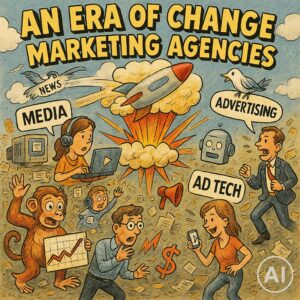Predictions 2026: Marketing Agencies Resign Their Agency

Once singularly focused client partners, marketing agencies are forgoing their franchise to act as agents on behalf of clients. Instead, they will become marketing purveyors that operate across several business modes: vendors that execute programs; merchants that resell software and media; affiliates that contribute capabilities to larger, matrixed organizations; and partners that deliver client-centric marketing services. With each consolidation, acquisition, or PE investment, marketing agencies’ vision moves further away from being providers of agnostic services and creators of culture to purveyors of enterprise platforms and orchestrators of strategy and execution. Put simply, your agencies will no longer act solely as your agents but also as owners of products/solutions, resellers of technology partnerships, and developers of emerging capabilities.
Several forces combine to bring about this shift. Low-margin project-based engagements have replaced once lucrative retainer fees. Two decades of marketing insourcing have created a saturated market, commoditizing creative ideation and execution. Consistent procurement pressure in the name of cost efficiency has forced service providers to monetize media, technology, and data. AI and automation is disrupting agencies’ labor-based economic model, as well as their operational workflows. The result is an industry in rapid change — and by the end of 2026, marketing agencies will be materially changed.
We explore five of the most significant changes in our latest report, Predictions 2026: Marketing Agencies. Among the seismic shifts in store for 2026, Forrester predicts:
- A dentsu or WPP acquisition will trigger a wave of agency reviews. The era of blockbuster holding company deals is far from over. Following Omnicom’s acquisition of IPG, Forrester predicts that Havas will acquire dentsu’s international operations. Alternatively, WPP may restructure for a sale to private equity or Accenture. Either scenario will prompt marketers to reassess their agency relationships. In fact, 85% of US B2C marketing executives plan to review their media agencies in 2026. This marks a significant uptick from assignments governed by three-to-five-year MSAs — six major brands reviewed media assignments in 2021, and 20 did so in 2023. When the big six condense to the big three, their emphasis on technology, data, media scale, and products will further push agencies to operate as purveyors as much as providers.
- Principal media will account for a third of total media under management. Agencies are shifting from agents to principals in media trading. In 2026, principal media — where agencies resell inventory with margins and guarantees — will account for nearly 33% of total agency billings. This model offers cost efficiency and value, especially in volatile markets. While critics raise concerns about transparency and brand stewardship, supporters argue that discounts and guarantees with disclosure make principal media a viable option. Agencies such as Omnicom, Publicis Groupe, and WPP are already leaning into this trend, integrating AI into their media trading strategies. More importantly, agencies like dentsu, Havas Media Network, Horizon Media, and Tinuiti have recently developed principal media offerings, crossing the threshold of buyer to owner. We predict that more will follow.
- A 15% reduction in agency jobs will cause agencies to change their business models. Automation and AI are accelerating workforce reductions across agencies. After an average 8% headcount cut in 2025, Forrester now forecasts a 15% reduction in 2026. This shift is not just about efficiency — it’s about transformation. Agencies will pivot from selling services to selling solutions. One global holding company CEO summed it up: “By 2028, we’ll double profits and halve the people.” CMOs must adapt by renegotiating contracts to reflect the solutions that agencies now offer, rather than just the time spent delivering them. Whether outcomes/performance-based, fixed fee, or product as line of business, when agencies are no longer primarily remunerated for talent delivery services, the nature of agency value changes. In 2026, the concept of human/technology equivalents will hasten the shift from service providers to solution purveyors.
Start Planning Today For What’s Coming Tomorrow
Forrester clients can access our full Predictions 2026: Marketing Agencies report to get more detail about each of these predictions, plus two additional predictions. If you would like to further discuss implications, please schedule a guidance session with me. And be on the lookout for my upcoming report examining the shift from agency service providers to marketing solution purveyors.
If you aren’t yet a Forrester client, sign up to get alerted when our complimentary Predictions guide covering our top B2C marketing predictions for 2026 will be available to download. And check back for additional complimentary resources, including upcoming webinars, on the Predictions 2026 hub.
